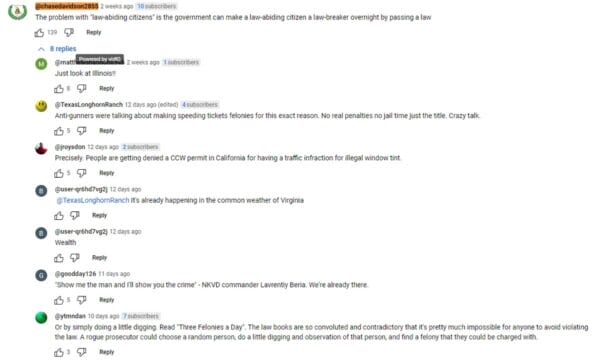In a groundbreaking decision, the 9th Circuit Court of Appeals sided with felon gun owners in the case of United States v. Duarte, overturning a federal law that prohibited felons, including non-violent offenders, from possessing firearms. This decision, which has stirred significant controversy, is seen as a victory by many Second Amendment advocates.
Understanding the Case
The case centers on Mr. Duarte, who had five non-violent felony convictions. In March 2020, during a traffic stop, Duarte was found in possession of a firearm, which he attempted to discard. He was subsequently indicted under 18 USC Sec. 922(g)(1), a law barring felons from owning firearms. Duarte’s defense, led by federal public defenders, argued that this law infringed on his Second Amendment rights.
A three-judge panel of the 9th Circuit applied the analytical framework from the Supreme Court’s Bruen decision. They concluded that Duarte’s right to bear arms for self-defense is protected by the Second Amendment and that the government failed to provide historical precedent to justify the lifelong ban on firearm possession for non-violent felons.
Key Points from the Decision
- Second Amendment Protections: The court ruled that the Second Amendment applies to all American citizens, including those with non-violent felony convictions. The judges emphasized that the right to bear arms is an individual right belonging to “the people,” which includes Duarte.
- Historical Context: The court found no historical tradition supporting a lifelong ban on firearm possession for non-violent felons. The government’s reliance on past precedents was insufficient under the Bruen framework.
- Government’s Argument: The government argued that felons are not part of “the people” protected by the Second Amendment, suggesting that only “virtuous citizens” have this right. The court rejected this argument, highlighting that such an interpretation could extend dangerously to other constitutional rights.
Controversial Points and Public Reaction
The decision has ignited a firestorm of responses, with many comments revealing deep-seated frustrations and controversial viewpoints. Here are some of the most brilliant points made by astute viewers:
Rehabilitation and Rights:

A dominant theme among commenters is the belief that individuals who have served their sentences should have their rights fully restored. @The_Privateer encapsulates this sentiment: “If you’re ‘rehabilitated’ enough to be released back into public circulation, you’re also rehabilitated enough to be able to exercise all rights.” This viewpoint is supported by the decision, which emphasizes that Duarte had completed his sentence for non-violent offenses and should, therefore, be entitled to his Second Amendment rights.
Government Overreach and Arbitrary Laws:

Many commenters expressed concerns about the potential for government overreach. @chasedavidson2855 points out, “The problem with ‘law-abiding citizens’ is the government can make a law-abiding citizen a law-breaker overnight by passing a law.” This aligns with the court’s analysis, which discusses the broad and often arbitrary nature of laws that can instantly criminalize previously lawful behavior, thus stripping individuals of their rights.
Taxation and Citizenship:
A recurring argument made by several commenters, including @user-gk4xt1mm5m and @Couldnt_let_J.Marston_die, is the inconsistency of denying felons their Second Amendment rights while still requiring them to pay taxes. They argue that if felons are not considered part of “the people” for gun rights, then they should not be obligated to pay taxes either. This painfully valid point is indirectly supported by the case decision, which highlights the flawed logic in the government’s arguments about who qualifies as “the people.”
Historical Precedents and Legal Shifts:

@liquidsmokemustang1537 brings up the historical context, noting that before the 1968 Gun Control Act, felons were not prohibited from owning firearms after serving their time. The video’s breakdown of the court’s reasoning reinforces this point, which found no historical tradition supporting the categorical ban imposed by 18 USC Sec. 922(g)(1).
If You Did Your Time, Keep Your Guns
The 9th Circuit’s decision in United States v. Duarte not only fuels Second Amendment rights but has also highlighted broader issues of government overreach, arbitrary lawmaking, and the rehabilitation of felons.
This ruling underscores the fundamental belief held by many in the gun rights community: that the right to bear arms is intrinsic to all American citizens, regardless of their past non-violent offenses.
As the fight for our rights continues, the conversation around Second Amendment rights, rehabilitation, and government authority remains as vital and contentious as ever. This decision serves as a reminder of the importance of defending constitutional rights and the ongoing struggle to balance public safety with individual freedoms.
Read Related:
-
Challenging the Status Quo: The Case for Allowing Convicted Felons to Exercise 2nd Amendment Rights
-
What Happens When Millions of Gun Owners Become Felons May 31st 2023?
from https://ift.tt/iMcYPfy
via IFTTT

No comments:
Post a Comment